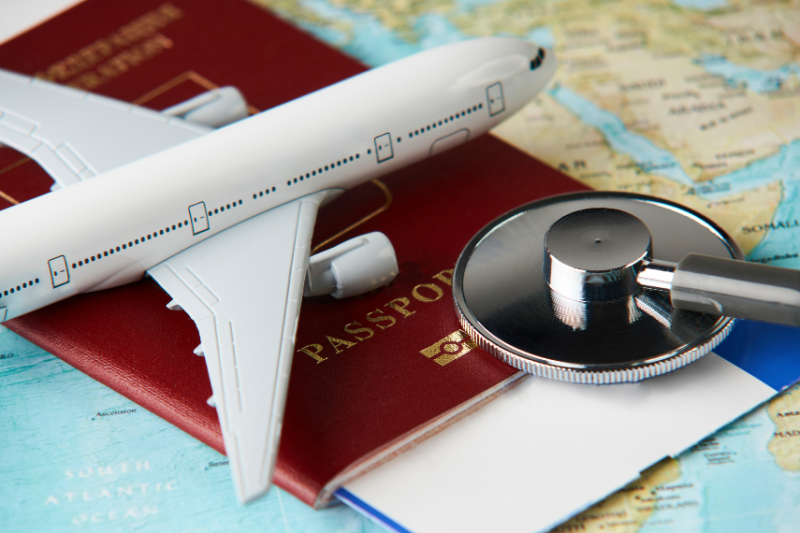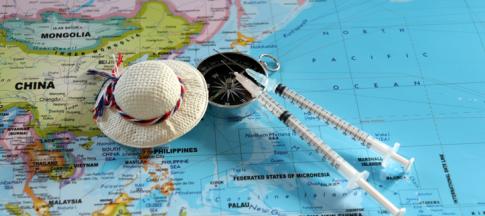
Jetting off on holiday is exciting, but dealing with high cholesterol on your travels can sometimes be challenging.
Read on to find out how you can travel safely with high cholesterol, and how this condition can affect your travel insurance.
The risks of travelling with high cholesterol
There are numerous risks to watch out for when travelling with high cholesterol, including:
- salty and fatty foods
- long periods of being sedentary
- lack of fluids
What to do before travelling with high cholesterol
If you have high cholesterol, there are a few things you can do to prepare for your next trip.
Speak to your doctor
Talk to your doctor to make sure they don’t have any concerns about the trip you’re taking.
You could also request a letter from your doctor about your condition so that if you do need medical treatment abroad, you can give this to any healthcare provider.
Prepare your medication
This includes making sure you’ve got enough medication for your trip (prescription medications are allowed in your carry-on luggage), as well as making sure the country you’re travelling to allows you to bring your specific medication across their borders.
Read our guide on how to safely travel with your medication.
Organise your documents
Keep your travel insurance documents, a list of the medications you take for high cholesterol, and your European Health Insurance Card or Global Health Insurance Card close to hand if you have one.
Consider your destination
Your access to medical attention may be more limited than in cities and towns if you’re travelling to a remote location.
Pack healthy snacks
It may be worth packing some healthy snacks for your journey or during your time at your destination so you can avoid high salt and fat foods.
What does travel insurance cover for people with high cholesterol?
People with pre-existing medical conditions are more likely to need medical assistance when on holiday, and might need to claim on their travel insurance.
A typical travel insurance policy should cover:
- emergency medical fees
- lost, stolen or damaged medication
- the cost of cancelling or cutting a trip short due to your condition
- repatriation if you need to return to the UK
If slightly older and travelling with high cholesterol, check out our guide to travel insurance for over 65s.
Does high cholesterol count as a pre-existing medical condition?
Yes. High cholesterol is considered a pre-existing medical condition by insurance companies, along with similar conditions like high blood pressure.
Does my condition affect my travel insurance?
Most insurers consider high cholesterol a pre-existing medical condition.
If you suffer from related conditions, like heart problems, high blood pressure, diabetes or circulatory issues, you should also tell your provider after you’ve been diagnosed.
Do I have to declare I have high cholesterol when buying travel insurance?
Yes. If you’ve been diagnosed with high cholesterol (including if this is only controlled by diet) or another pre-existing medical condition, you should tell your current travel insurer immediately (regardless of whether you have any trips booked).
If you’re about to sign up for travel insurance, make it clear that you have this condition when you register.
If you don’t tell your insurer about a pre-existing medical condition (including high cholesterol), you may not be able to claim if something happens as a result of your condition on holiday.
Will it affect the price of my travel insurance?
If you have high cholesterol or another pre-existing medical condition, it may make your travel insurance more expensive.
But having to pay for your own medical care abroad, if you needed to, would be more expensive.
The cost of your travel insurance policy will always depend on:
- where you’re travelling to
- how long your trip is
- what you’ll be doing on your trip
- the nature or severity of your pre-existing medical condition
Does a GHIC or EHIC cover my high cholesterol?
Yes, it can do. The EHIC (European Health Insurance Card) and GHIC (Global Health Insurance Card) can be used to reduce medical costs when travelling in certain EU countries.
It’s important to remember the EHIC and GHIC don’t fully cover medical expenses but can help reduce the cost. No repatriation or private medical costs are covered by either of these cards.
Read our guide on using the EHIC or GHIC card.
MoneyHelper Directory
If we can’t cover your medical condition, you can use the MoneyHelper directory to find a specialist insurer who might be able to cover you if you’ve been:
- Refused travel insurance or had your policy cancelled
- Offered cover with a medical exclusion that you can’t remove from your policy
- Quoted a price for a travel insurance policy with high medical costs
MoneyHelper makes it easier to find and compare policies you can afford that cover your condition and medical needs. Access the MoneyHelper directory online or call MoneyHelper on 0800 138 7777 (phone lines are open Monday to Friday, 8:00am to 6:00pm, excluding bank holidays).


